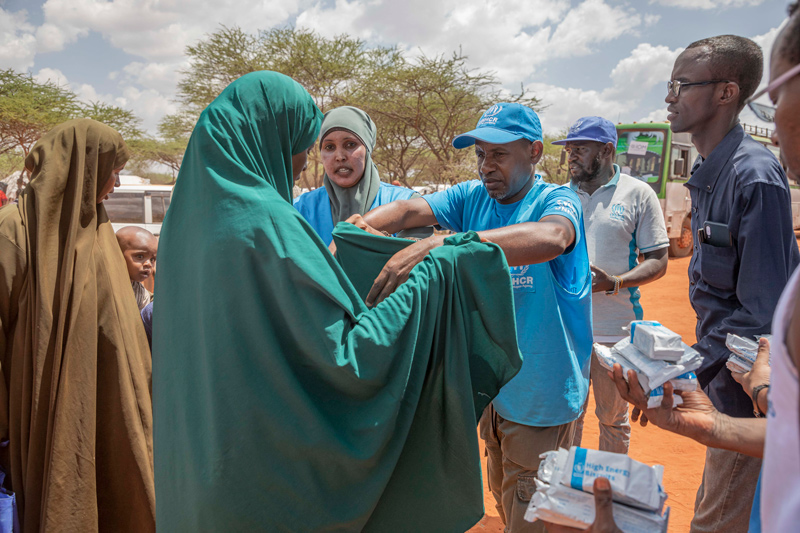


UN World Refugee Day
Photo courtesy of UN Refugee Agency June 20, 2023
UD faculty and leaders discuss the growing global humanitarian crisis
Editor’s note: Georgina Ramsay is an associate professor, specializing in political and legal anthropology. Holly Myers is an assistant professor of Russian in the Department of Languages. Matthew Kinservik is vice provost for faculty affairs. Ravi Ammigan is associate provost for international programs. All four are part of the University of Delaware, which welcomed women from war-torn Afghanistan and is celebrating the 100th anniversary of its launch of the first study abroad program.
World Refugee Day takes place every year on the 20th of June, an international day dedicated to refugees around the world who have been forced to flee their home countries to escape conflict and persecution.
This year’s celebrations on Tuesday, June 20, are particularly sobering. The United Nations announced on World Refugee Day 2023 that the number of displaced people worldwide has reached 108.4 million, the highest number ever recorded. That means that the number of people unable to live in the place they call home is equivalent to nearly a third of the population of the United States.
The number of displaced people has more than doubled over the past decade. War and conflict in countries like Syria, Afghanistan, Ukraine and Sudan are behind the rapid increase, and it is likely that this number will only continue to grow as conflict and political instability continue worldwide.
But the announcement of the number of displaced people is still an underestimate of the true scale of global displacement. The United Nations does not count people who are displaced because of disasters or climate change. When we consider the rapid rate at which climate change is impacting the livability of certain areas around the world, it becomes clear that the true number of displaced people is much higher than these official numbers and is only likely to increase.
War and environmental problems often compound. Take, for example, the recent collapse of the Kakhovka Dam in Russian-controlled southern Ukraine, which, according to the Ukrainian Interior Ministry, required the evacuation of thousands of people and a struggle to find clean drinking water for thousands more. Ukraine also warned about the new danger of landmines, unearthed and carried by the water from where they were originally buried.
Displacement is clearly one of the most pressing problems of our time. So what does this mean for the UD community, and how is the University responding to global displacement?
UD as a global hub
As UD celebrates the 100th anniversary of its influential study abroad program, it’s worth remembering that the original goal was to show UD students the importance of intercultural exchange in the face of global conflict and displacement. A veteran of World War I, Professor Raymond Kirkbride proposed and led the program at a time when isolationism and nationalism were powerful forces in American politics and culture. The program was immediately successful and grew to include students from several colleges and universities, including Columbia University, the University of Pennsylvania, Wellesley College, Wesleyan University, Brown University, Smith College, Harvard University and Princeton University. During World War II, UD’s study abroad alumni raised money to assist the Red Cross, testament to the program’s lasting humanitarian and philanthropic power.
Today, UD students carry on this legacy in multiple ways. The popular World Scholars Program offers students a global experience from their first semester abroad through to graduation. And short-term study abroad programs continue to enroll high numbers of students each year. In addition, there are increasing on-campus opportunities for global engagement and advocacy, including weekly International Coffee Hours, student-led fundraising to support Ukrainian war victims, and service learning opportunities with displaced Afghan students and families in Newark.
The UD community does not have to look at situations overseas to see the significant impact of global displacement. On World Refugee Day, we can honor displaced people and refugees in our own community by recognizing the work that is already happening in our state to support people who have been displaced.
Every year, Delaware becomes home to newly resettled refugees from several different countries. These refugees arrive through the U.S. government’s resettlement program, and their immediate needs are supported by the local nonprofit Jewish Family Services, alongside other community partners and volunteers, including UD faculty, staff and students.
World Refugee Day is an opportunity to learn about the scope and nature of the refugee crisis and to consider how the Blue Hen community can engage in educational and service opportunities to learn and do more to mitigate this pressing global challenge.
Recent UDaily stories about refugees
— UD welcomes Afghan refugees, published Dec. 3, 2021. Fifteen Afghan women, among 56 who left Afghanistan for U.S. colleges as the United States withdrew its military forces, landed in Newark to start their new lives.
— Beginning new lives at UD, published March 24, 2022. Four Afghan women who narrowly escaped the Taliban described opening new chapters as members of the Blue Hen community.
— Sharing refugee stories, published Oct. 28, 2022. The 2022 UD Common Reader was While the Earth Sleeps We Travel: Stories, Poetry, and Art from Young Refugees Around the World, written by Ahmed M. Badr. Badr spoke to UD students at Mitchell Hall about his experiences, including his bombed home in Baghdad.
— The urgency of now, published Feb. 23, 2023. On the first anniversary of war in Ukraine, UD alumnus Atnre Alleyne shared his family’s escape and our shared humanity.
Contact Us
Have a UDaily story idea?
Contact us at ocm@udel.edu
Members of the press
Contact us at 302-831-NEWS or visit the Media Relations website

